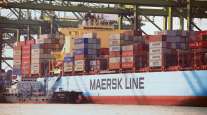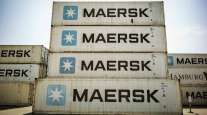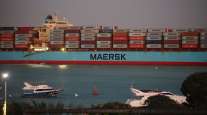Sanity Returning to Shipping as Freight Rates Gain, Maersk Says

The bankruptcy of South Korean ocean carrier Hanjin Shipping Co. and consolidation in container shipping will pave the way for a better 2017 for the industry, according to Robbert van Trooijen, the Asia-Pacific chief of Maersk Line.
After years of overcapacity and excessive optimism about demand, the order backlog for vessels is falling and Maersk Line is seeing a more balanced supply-demand situation this year in its talks with customers, he said Feb. 10. Maersk Line, the world’s biggest box carrier, is owned by A.P. Moeller-Maersk A/S.
RELATED: World’s biggest shipping company voices alarm at Trump trade war
“It’s the growth side and the right-sizing of the industry, and the sanity that comes back in the negotiations,” van Trooijen said in a Bloomberg Television interview with Rishaad Salamat in Hong Kong. “We do see now that the normalization has come back to that.”
Maersk Line, which expects to be profitable in 2017 after a $384 million loss it booked last year, expects the global container market to grow 2-4% amid the consolidation wave. After Hanjin’s collapse, Japan’s three biggest shipping companies decided to merge their container operations, while Copenhagen, Denmark-based Maersk agreed in December to buy Hamburg Sud. Freight rates are rebounding, van Trooijen said.
The Shanghai Containerized Freight Index, a measure of shipping rates, has more than doubled from a record low reached in March last year.
“It’s been a decisive year for container shipping, not just because of the financial climate, but also because of the M&A activities and the regrettable bankruptcy of Hanjin,” van Trooijen said, adding the consolidation efforts will continue. “We see fewer orders for ships.”
Growth in shipping demand in 2017 is expected to outstrip an increase in supply for the first time since 2011, Changjiang Securities Co. said in a note dated Feb. 10.
Asked about rising concerns over trade protectionism after Donald Trump became U.S. president, the Maersk executive said countries have a vested interest to grow trade rather than shrink it.
A “trade war has no winners,” van Trooijen said. “Growing global trade in a mutually beneficial way, that benefits the U.S. consumers as well as the producing entities in China, is the only way forward.”
With assistance by Dong Lyu




